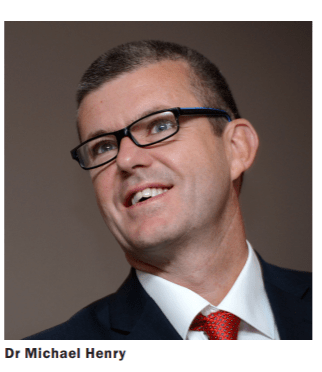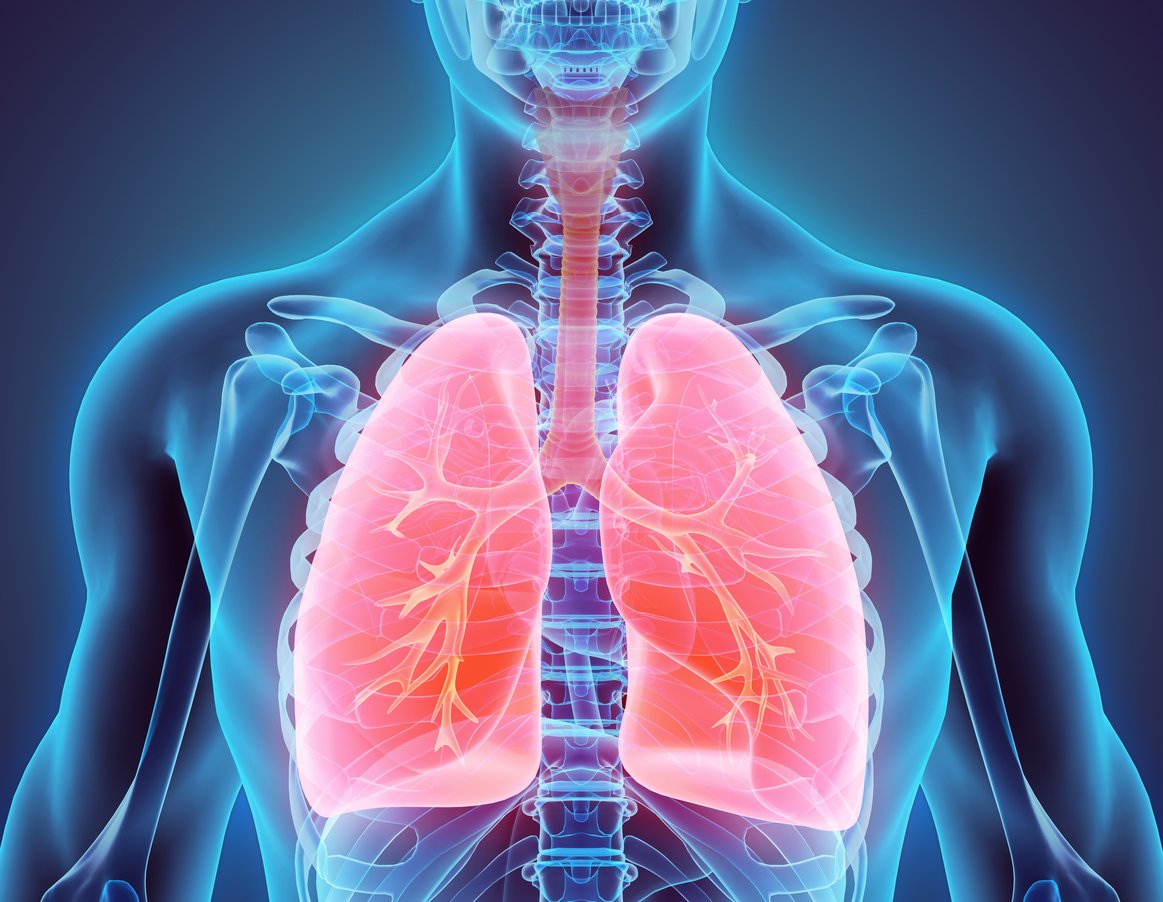Paul Mulholland speaks with Consultant Respiratory Physician Dr Michael Henry about the upcoming Irish Thoracic
Society Annual Scientific Meeting at a time when respiratory services are struggling with the continuing Covid surge
It had been hoped, until recently, that the upcoming Irish Thoracic Society (ITS) Annual Scientific Meeting, which will take place on 19 November, would be a face-toface event. However, according to Consultant Respiratory Physician, Cork University Hospital (CUH), Dr Michael Henry, the ITS believed this was too great a risk given the deteriorating Covid situation in the country.
Instead, the meeting, which will feature an impressive range of speakers, will be held virtually for the second year running. Covid-19, of course, is not just affecting educational meetings, but the day-to-day working lives of medical professionals across the country. Dr Henry told the Medical Independent (MI) that three specialties have been most negatively impacted by the current crisis: Infectious disease; intensive care; and respiratory medicine.
“And all three services, particularly respiratory and intensive care – you see it on the news every day – are struggling
badly,” he said.
Advocacy
One of the key roles of the ITS, especially at the current time, is to advocate for patient safety. In terms of Covid-19, this includes the promotion of healthcare guidelines, such as handwashing and mask-wearing. It also means agitating for more resources for the specialty and the protection of staff working in respiratory medicine. Regarding the latter, the roll-out of the booster Covid-19 vaccine for healthcare workers, which was recently announced by Government, is “massively important”, according to Dr Henry.
“Most healthcare workers are young and healthy and they are not going to get very sick,” he said. “But they will be off work. And if they are off work from a service that is already struggling, then you are really going to struggle to provide services for everybody with respiratory disease. So we need to highlight that as much as we can.”
Covid-19 has had a direct impact on the staff working in the respiratory medicine department in CUH. Dr Henry himself was diagnosed with Covid in January, and two of the other three consultant respiratory physicians have also been infected, in addition to the majority of registrars. While thankfully none of these infections led to serious illness, the need for such a high number of staff to take time off work has severely hampered the service, he said.
The department has been struggling not only in terms of staff, but also due to a lack of resources. Dr Henry has not seen much evidence in CUH of the additional funding that has been released to cope with the pandemic.
“The extra resource that has been put in to deal with Covid amounts to one Covid ward that is staffed to just look after Covid patients,” he said. “But you have no choice but to do that. Every hospital has to have an isolation ward where Covid patients go. Other than that, access to extra staff, diagnostics, treatment, I would say, if anything, has gotten worse, not better, over the last 12 months.”
Covid impact on respiratory services
While Dr Henry said the effect of the cyberattack was as bad, if not worse, than the pandemic, services for other conditions have been “devastated” over the past year-and-half because of Covid-19. To take one example: CUH’s pulmonary function laboratory has only worked at approximately a quarter of its capacity since the Covid crisis began.
This is due to a range of factors, such as the emergency department appropriating part of the workspace,
the greater need for sterilisation, and the safety concerns of staff. “The knock-on effect of it all is that we get
less than a quarter of the number of tests done that we need to get done,” he told MI.
“So if you have a lung cancer patient who needs an urgent part of their lung removed, we can’t get it done for weeks. It shouldn’t be holding up the process at all. Also, I run a lung fibrosis clinic that I’m doing this afternoon. I would have 20-something patients coming; most of them should have had their pulmonary function tests done.
I would say I’d be lucky if three or four have them done. This is how you monitor if patients are getting better or worse. Most of it, not all of it, is down to Covid. That has a huge impact on how we manage all of these complex respiratory patients.”
The department’s outpatient space was also appropriated at the beginning of the pandemic. As a result, outpatient consultations have moved off-site, and now take place in a local convent.
“The facility is just really poor, and not fit for an outpatient service. And that is the direct result of the other area that was previously used now being taken for Covid pathways. To put it mildly, it has devastated our service here. It will be different in different hospitals. But I’m sure everybody will tell you the same thing. It is having a huge effect on how we are running our service. We are not running our service very well because of this.”
Meeting
While there is disappointment about not having a face-to-face meeting, Dr Henry said the event will still be crucial in having members come together, albeit virtually, and hear about the latest developments in their fields. “Because very few of us have had the opportunity to travel to international educational meetings,” he explained.
“There’s been no opportunity really.
Some of it has been online and we have been trying to keep up to date. But it is critical for our own continuing development in medical education that we have these programmes coming online or face-toface regularly so we can keep up to date as to what is going on.”
Dr Henry emphasised the annual meeting will have “great speakers”, both national, and international. On the national side, Prof Cormac McCarthy, Consultant Respiratory Physician, St Vincent’s University Hospital, Dublin, will speak about diffuse cystic lung diseases. “That’s going to be really good; he is a world leader in that area,” according to Dr Henry.

The meeting will also hear from Prof John Cryan, Professor and Chair, Department of Anatomy and Neuroscience, University College Cork. The title of Prof Cryan’s talk is ‘Gut microbiome: Our inner friends with benefits’. “If you know anything about the [Department of Anatomy and Neuroscience] here in Cork, it is one of the top five international research centres in the world. He is looking at the gut microbiome and its effect on the lung. That might sound very highfaluting, but I think that is going to be very exciting for us.”
The international speakers include Prof Thierry Troosters, Professor in Rehabilitation Sciences, KU Leuven, Belgium, who will speak about pulmonary rehibition; and Prof Dirk-Jan Slebos, Professor of Interventional Pulmonology, University Medical Centre Groningen, Netherlands, who will speak about bronchoscopic interventions for COPD and
chronic bronchitis. Both are world leaders in their respective fields.
According to Dr Henry, one of the highlights of the meeting will be a talk on lung cancer screening to be delivered by Prof Harry de Koning, Professor of Public Health and Screening Evaluation, Erasmus University Medical Centre, Rotterdam, Netherlands. The title of the lecture is ‘Implementation of lung cancer screening: Prime time!’.
“There is a lot of work around the world on screening for lung cancer,” according to Dr Henry. “And clearly that is really topical. It hasn’t really reached prime time in Ireland yet. He is one of the leads in a very big European lung cancer screening trial. And he is going to bring us up to date on that. And hopefully that will push the agenda in Ireland on screening for lung cancer in the same way we screen for breast cancer, colon cancer, etc.
We don’t, as of yet, have that programme here. But I think these types of people speaking in Ireland to Irish audiences will help promote that.” In conclusion, Dr Henry said the huge challenges in dealing with the pandemic make events such as the ITS Annual Scientific Meeting particularly important. “I think it is really critical for health workers that we all, at least, have the chance to get together, even if it is virtually. That we get a chance to meet as a community to try and keep a certain degree of solidarity going, encourage each other, and promote, not just Covid research and development, but other areas as well.
Because it is important, as a respiratory community, that we don’t lose touch with each other in this era of Covid. That we stay in touch, and try to promote proper respiratory health values in the situation we find ourselves in.”













Leave a Reply
You must be logged in to post a comment.